On July 23, the forum on "Reducing Food Waste and Promoting Green Living" hosted by United Nations Environment Program (UNEP) China Office and organized by the School of Environment, Tsinghua University was successfully held in the Tsinghua Sino-Italian Environmental Energy-saving Building. Representatives and experts from relevant international organizations, embassies in China, government departments, industry associations, well-known enterprises, non-governmental organizations, universities, research institutes, and student associations attended the meeting to discuss systems, strategies, methods and experiences of reducing food waste from different dimensions and at multiple levels, as well as to analyze the opportunities and challenges of reducing food waste and promoting green life for China’s ecological civilization development driven by the goal of carbon neutrality.
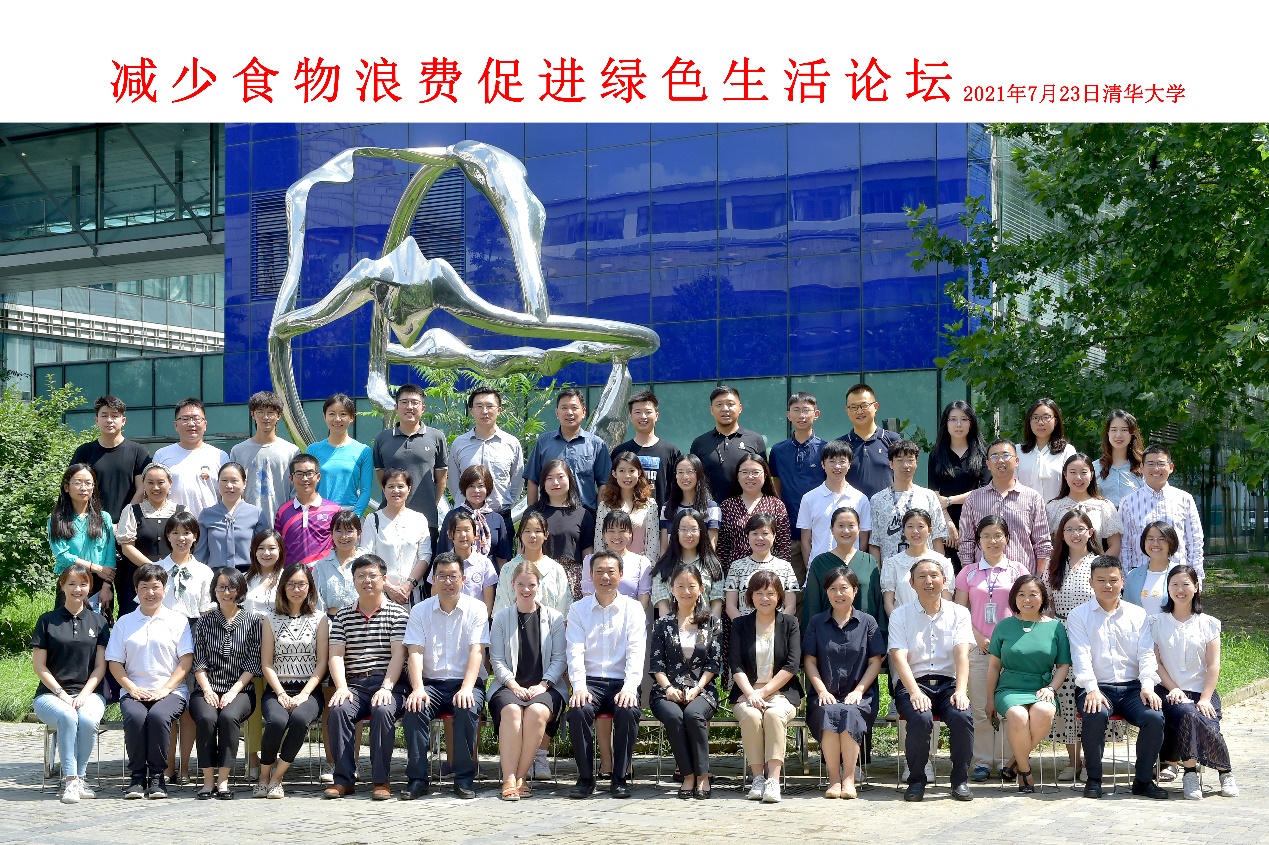
Group photo of participants
In the opening ceremony, Mr. Tu Ruihe, Representative of the UNEP China Office, and Professor Liu Yi, Dean of the School of Environment of Tsinghua University, delivered speeches respectively, emphasizing the severity of global food waste and the importance of reducing food waste. They called on people from all walks of life to pay more attention to food waste, form partnerships and take vigorous actions on sustainable food production and consumption for green and low-carbon life. Ms. Linda Hjelle, Environmental Counselor at the Royal Norwegian Embassy in China, and Mr. Cheng Lujia, Commercial Officer at Royal Danish Embassy in China respectively shared the experience and achievements of Norway and Denmark in reducing food waste through multi-party cooperation, education and training, and technological innovation.
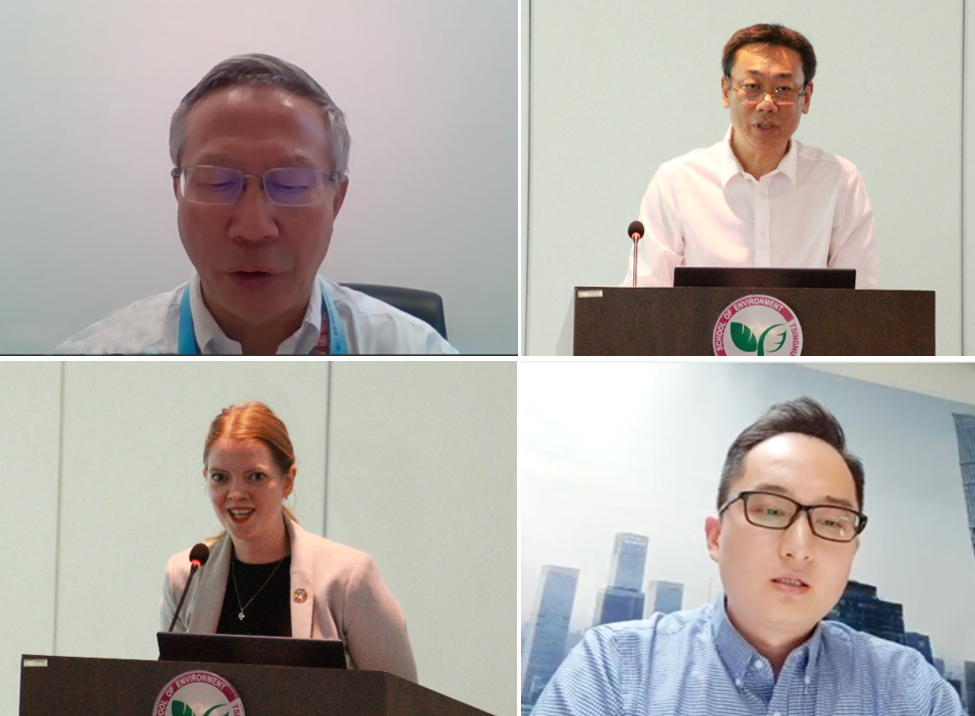
Speeches by the guests (from left to right and top to bottom: Mr. Tu Ruihe, Professor Liu Yi, Ms. Linda Hjelle, Mr. Cheng Lujia)
Food waste exists in the whole life cycle of food production, processing, distribution, consumption and waste disposal, involving numerous stakeholders in various fields such as environmental management, agricultural production, food processing, waste treatment, product design, culture and education, environmental protection and public welfare. In the special report session of the forum, Dong Zhanfeng, environmental management expert and Deputy Director of the Environmental Policy Department of the Chinese Academy of Environmental Planning (CAEP), shared the analyses and countermeasures of the ecological and environmental impact of food waste. Zhao Guohua, food and agriculture expert and Vice President of Southwest University, put forward suggestions on reducing food waste considering post-harvest storage, transportation, processing and circulation. Wang Wenhua, Deputy Secretary-General of China Chain-Store & Franchise Association (CCFA) and representative of the industry association, shared the practical experience of chain enterprises in reducing food waste in the speech "Chain Enterprises in Action to Reduce Food Waste". Liao Qimei, representative of "zero-waste cities" and Director of Shenzhen Municipal Household Waste Classification Management Center, delivered a speech titled “‘Clear Your Plate’ Campaign in Shenzhen” to share the city's experience in the campaign against food waste. Zhong Fang, product design expert and teacher from the Academy of Arts & Design, Tsinghua University, provided suggestions to reduce food waste from the perspective of design in her book "Reducing Food Waste: What Can Design Do?”. Xu Wenjing, representative of public welfare organizations and Project Officer of Vanke Foundation, brought forward a proposal on reducing food waste and healthy eating in her speech "Reducing Food Loss and Waste, Advocating Healthy Eating". Wu Min, expert on cultural enterprises and founder of Hangzhou Shihua Culture Media Co., Ltd., shared her experience on the theme of "Sustainable Future of Healthy Diet". Professor Ren Lianhai, waste treatment expert and Chairman of the Organic Solid Waste Special Committee of China Association of Urban Environmental Sanitation (CAUES), analyzed the situation of organic waste treatment in China's catering industry. Professor Liu Jianguo, Director of the Institute of Solid Waste Management of the School of Environment, Tsinghua University, presided over the opening ceremony and the special report session of the forum.
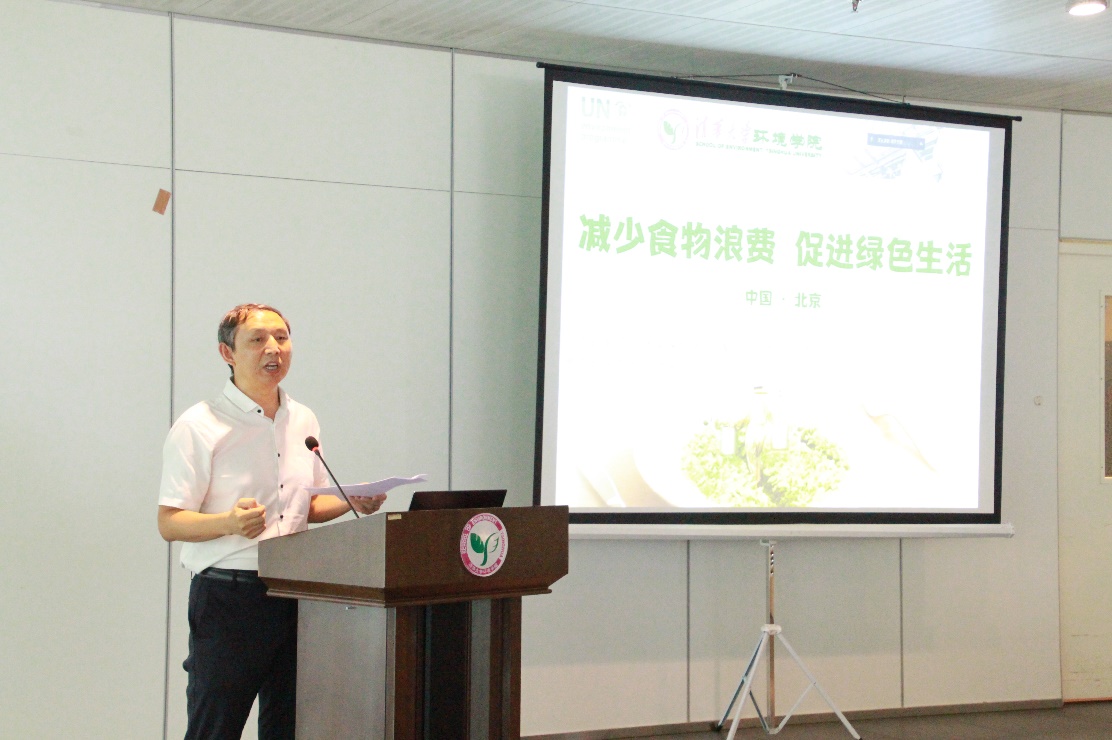
The opening ceremony and special report session moderated by Professor Liu Jianguo
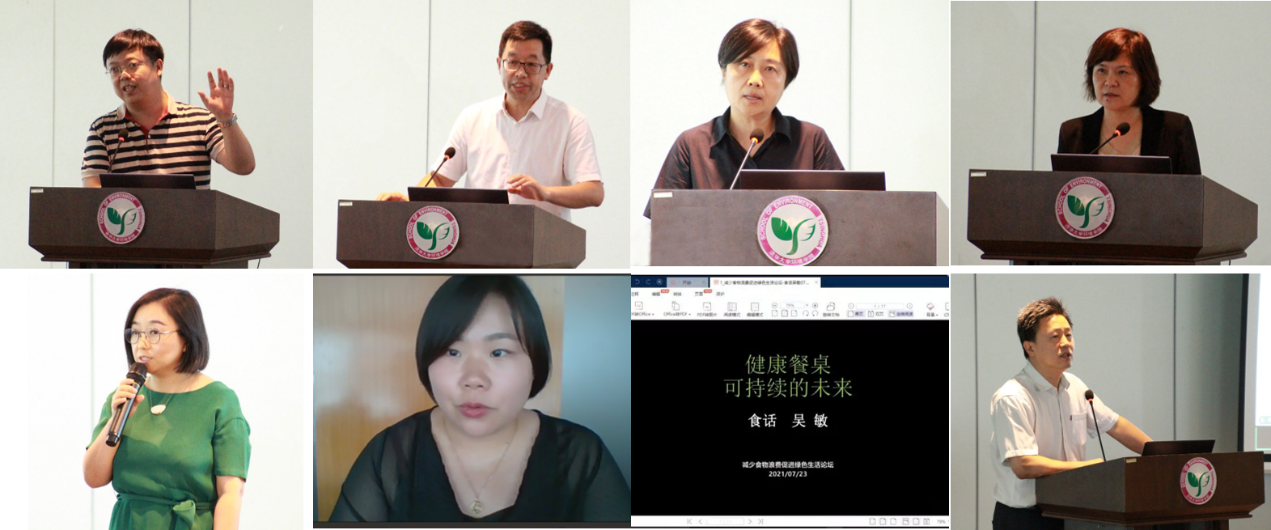
Special reports delivered by guests (from left to right, from top to bottom: Researcher Dong Zhanfeng, Professor Zhao Guohua, Deputy Secretary-General Wang Wenhua, Director Liao Qimei, Professor Zhong Fang, Ms. Xu Wenjing, Ms. Wu Min, Mr. Ren Lianhai)
In recent years, many international environmental organizations and research institutions have taken a series of effective measures in reducing food waste. The forum featured a dialogue on "International and Domestic Experience Sharing", presided over by Ms. Wang Qian, Program Management Officer of the UNEP China Office. Wang Hongyue, senior program specialist of the World Wide Fund for Nature (WWF), Gao Si, Chief Representative of IVL Swedish Environmental Research Institute in China, Liu Xiaojie, associate researcher in the Institute of Geographic Sciences and Natural Resources Research (CAS), Li Bing, Chairman of Shanghai Green Oasis Public Service Development Center, and Wu Guifang, Application Development Director of Novozymes China Investment Co., Ltd., respectively shared the project results and valuable experience of their institutions in reducing food waste.
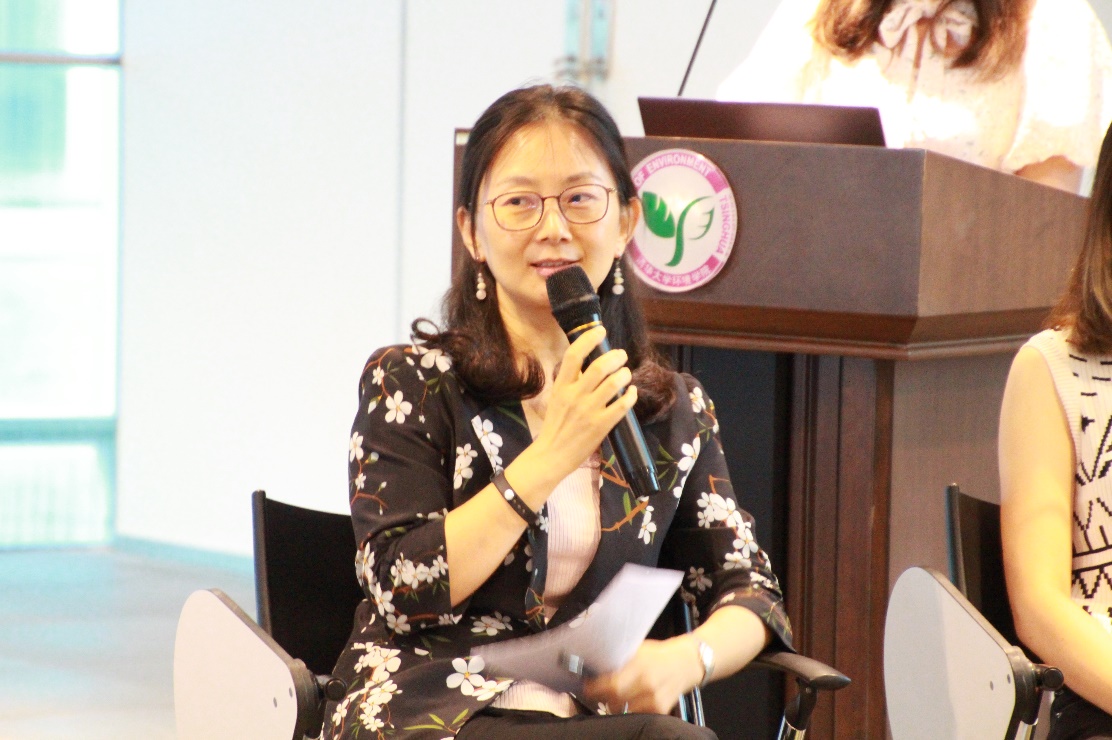
The session of "International and Domestic Experience Sharing" moderated by Ms. Wang Qian
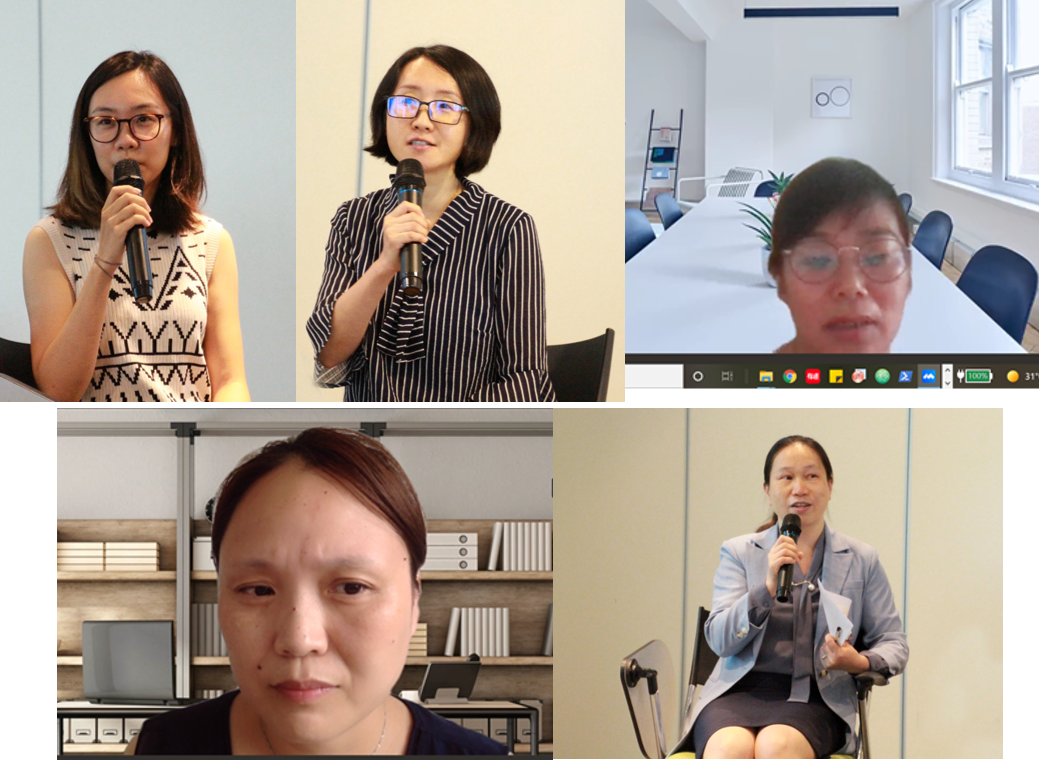
The "International and Domestic Experience Sharing" dialogue session (from left to right, from top to bottom: Ms. Wang Hongyue, Ms. Gao Si, Associate Researcher Liu Xiaojie, President Li Bing, and Director Wu Guifang)
Young people play an essential role in the future of society and food waste, whose awareness and actions are vital to reduce food waste. In the special dialogue session "Young People in Action" chaired by Professor Liu Jianguo, young representatives including Huang Wen, Chairman of the Water Drop Environmental Protection Center in Luohu District, Shenzhen City, Liu Jichen, founder of the“Clear Plate” APP, Xu Siyuan, President of Qingyuan Association of Tsinghua University, Ge Xinran and Li Jiaqi, students from the Global Environment Program of School of Environment, Tsinghua University, gave impassioned and eloquent speeches, showing the innovative thinking, forward-looking action and bright vision of young people in reducing food waste.
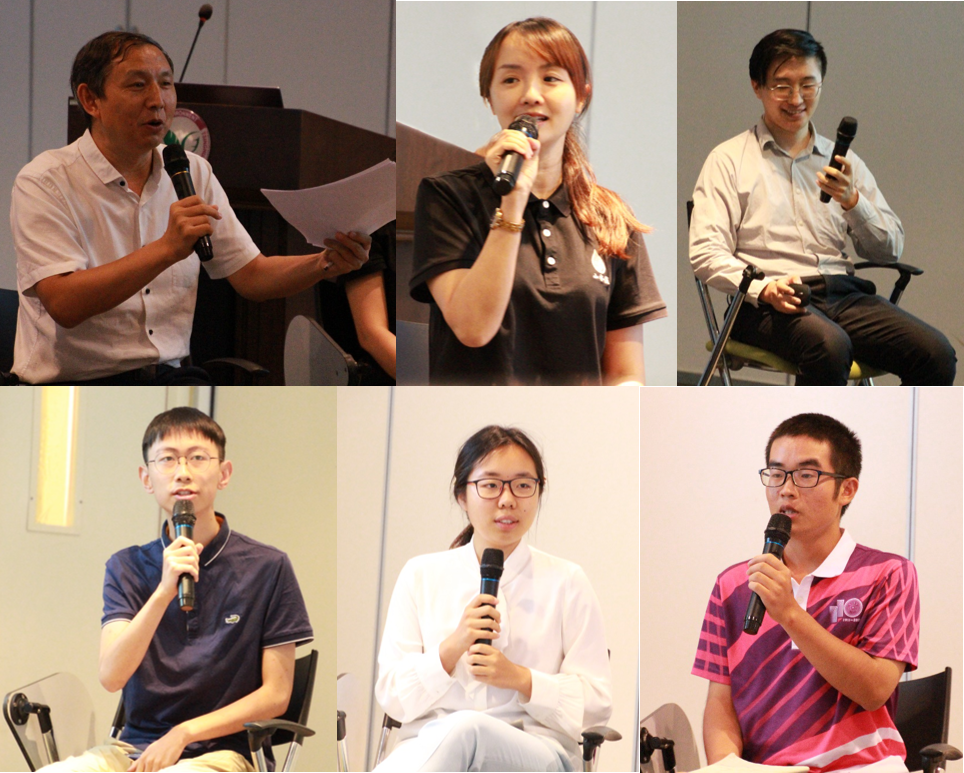
The dialogue session of "Young People in Action" (from left to right, from top to bottom: Professor Liu Jianguo, Chairman Huang Wen, Liu Jichen, Xu Siyuan, Ge Xinran, Li Jiaqi)
As a global issue highly concerned by the international community and faced by countries all over the world, food waste is closely related to the Sustainable Development Goals of the United Nations as well as environmental security, food security and social equity and justice. Reducing food waste figures significantly in reducing greenhouse gas emissions, improving the quality of the living environment and optimizing the management of material metabolism. It is also an important way to improve green production and life style, the level of ecological civilization and high-quality economic and social development. China attaches great importance to the issue of food waste, and General Secretary Xi Jinping has made important instructions on reducing food waste on many occasions. The Anti-Food Waste Law of the People's Republic of China, which took effect on April 29�, 2021, has laid a solid legal foundation for eliminating waste in both the food supply chain and the consumer end. China is vigorously promoting the waste sorting and building "zero-waste cities", moving towards the goal of "carbon peak by 2030 and carbon neutrality by 2060", which puts forward urgent requirements for setting up the institutional system, technological system, market system and cultural system to reduce food loss and waste in the whole process and strengthen resource conservation and recycling in the whole system.



